BLOCKED — USU’s social media policies called into question
Editor’s Note: Several items are blacked out in the photos for privacy and vulgarity.
*This story was updated on Jan. 25 at 11:21 a.m.
Students at Utah State University have raised concerns about the school’s social media policies after the university blocked a current student during USU’s semiannual Gripe Night in December.
Gripe Night is a tradition in which students are encouraged to post their “gripes” about campus life. Some topics covered in December included “diversity, mental health, the university’s handling of COVID-19, on-campus parking, students not wearing masks and not social distancing at football and basketball games,” as reported by Statesman writer Karcin Harris.
What concerned many students who participated in Gripe Night was how the university dealt with criticism. Several students reported being blocked, including Grant Bess, whose series of tweets ended with him being blocked by the university on Twitter, Facebook and Instagram by the end of the night.
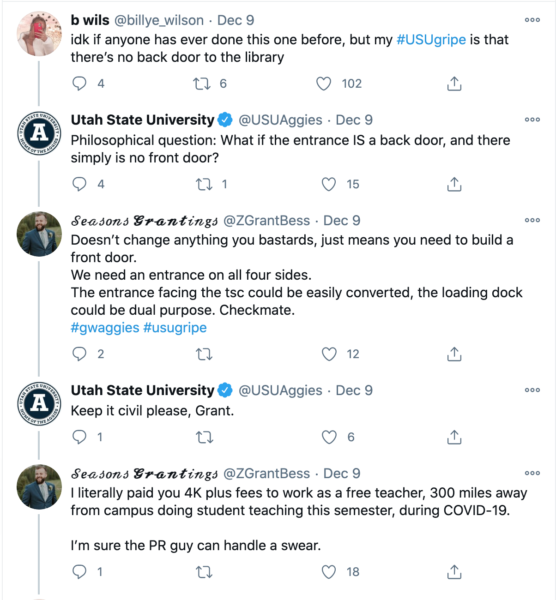
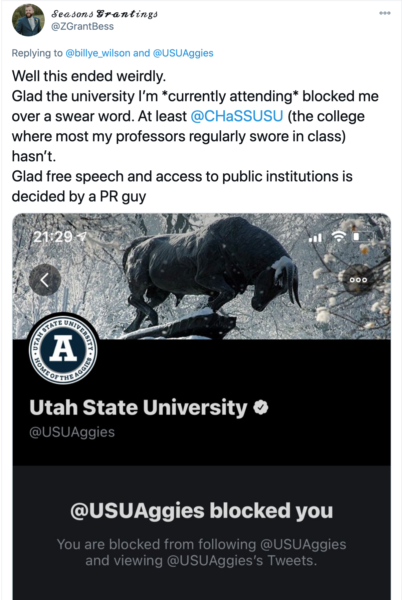
“I didn’t even direct it at anyone,” Bess said. “I just think they shouldn’t have the right to block anyone that isn’t harassing the account.”
According to Bess, an official account verified by Twitter should not be blocking students who rely on the university for information.
“They use that account for official communication, warnings of emergencies and as a tool to dispatch important information. I should have access to it, as a current student and, frankly, as a taxpayer,” he said.
A 2019 Wisconsin federal district court case established that the interactive portions of state legislators’ Twitter accounts constituted designated public forums. In another 2019 fourth circuit case, the court held that the Facebook page of the chair of a county board, which she used for public announcements and to solicit public comment, was a public forum for First Amendment purposes.
According to the American Council on Education, a designated public forum, or a limited public forum, can be subject to censorship. However, limitations must be viewpoint-neutral and reasonable to time, place and manner.
The council has also stated that if campus officials open up a social media site for interactive communication, “those who wish to post on the site cannot be blocked simply because campus leaders oppose their viewpoints.”
According to USU’s public information officer Emilie Wheeler, USU’s social media policy specifies there are three ways in which a student or organization can be blocked: The account is a spam account that obsessively promotes a product or service, an individual or company is sending pornographic material or the account is a student making threats or directly attacking a USU employee.
Wheeler said there had been previous problems with Bess on Twitter and replying with “Keep it civil please, Grant,” acted as a warning.
“There was no formal warning, this time or any other time ‘previously’ before a ‘breaking point.’ Both are ridiculous,” Bess said. “Nothing I’ve said could be reasonably construed as a ‘threat’ by a reasonable person, under legal code or student code. A university is supposed to be an open public forum of discourse, not a prude’s pantheon.”
Another USU student, Cameron Moellendorf, believes they were blocked because of their position on the LGBTQ community.
“They [USU] tweeted something for pride about how the school is welcoming to all, which I disagree with,” Moellendorf said.
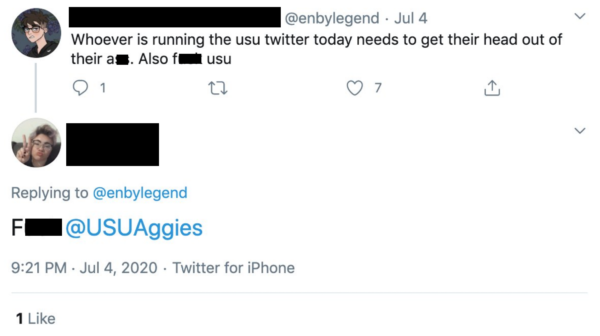
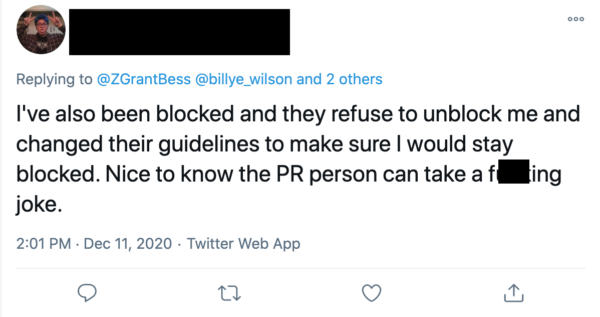
The university updated its social media policy on Facebook after Moellendorf asked why the policy did not directly mention blocking students.
“It’s up to the discretion of our social media managers,” the university said. “After our exchange with you last week, we determined it was a good idea to update it in the ‘about section’ moving forward.”
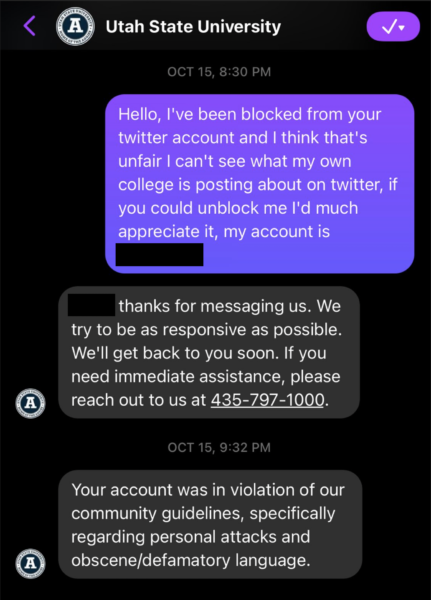
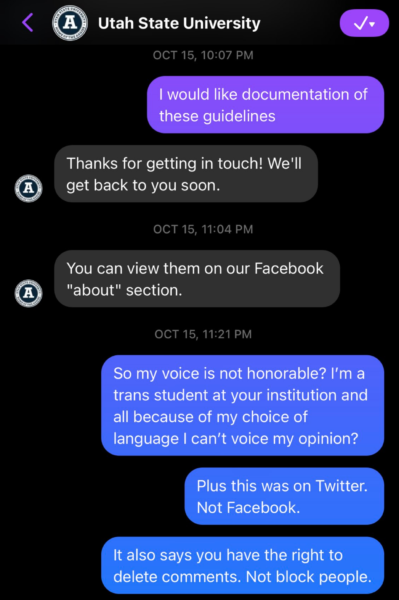
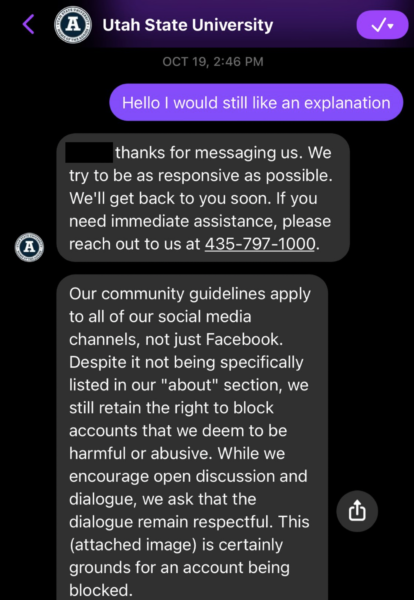
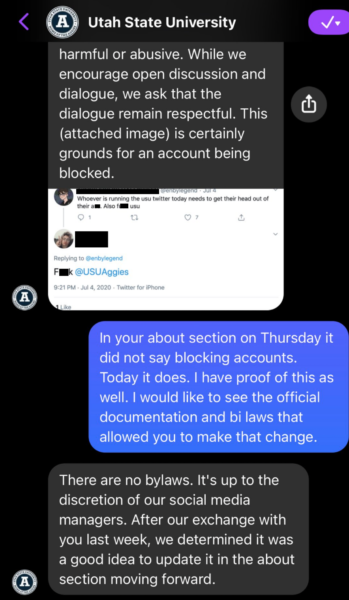
Hailey Darrow wrote a tweet expressing her disappointment about USU’s response during Pride Month and their lack of response for the Black Lives Matter movement. Darrow said she thought the university took their original tweet down. She soon received a personal message via Instagram from Matthew Gerrish, assistant director of social media, who claimed this was not the case.
“By the way,” wrote Gerrish, “until I got here, USU had never done anything for Pride Month on their social media.”
He then ended the direct message by saying “Oh, and the post is not gone.” He added a link to the tweet.
The Statesman was unable to contact Gerrish.
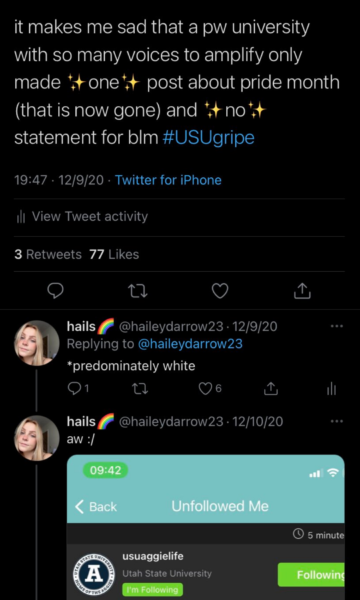
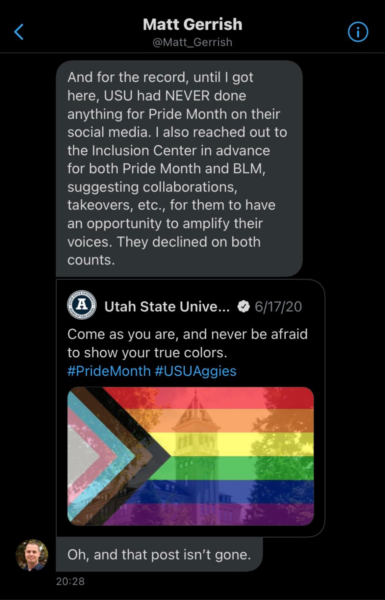
“A few other students and I were unfollowed by the usuaggielife Instagram. Then the page went back and replied to one of my stories a few days later,” Darrow said.
Darrow sent an email to Gerrish voicing her concerns about the university’s handling of Gripe Night. Gerrish claimed the university did the best they could.
“Students, myself included, only criticize because we care and want the university to do better, but I feel like I was completely dismissed with how they handled the situation,” Darrow said.
Another issue that has been raised is the inconsistency with other departments’ policies.
Luis Rodriguez, the program coordinator for the Inclusion Center, said his department is not allowed to block or remove students for offensive tweets.
Several students also reached out to Rodriguez with concerns that the university is blocking people over criticism of the university’s handling of LGBTQ issues and Black Lives Matter.
Vice President of Communications, Amanda DeRito, said any student who feels they are being blocked for opinions about Black Lives Matter or the LGBTQ community can submit their concerns to the USU Office of Equity.
Following discussions with Rodriguez, DeRito also said the school would be contacting social media managers in other departments to ensure their social media policies were all on the same page.
“We are never done with this issue, social media is continually evolving,” DeRito said.
*As of Jan. 23, the university made the decision to unblock Grant Bess from their social media platforms.
—sydney.dahle@usu.edu, @dillydahle
—taylorcripe@gmail.com, @cripe_taylor

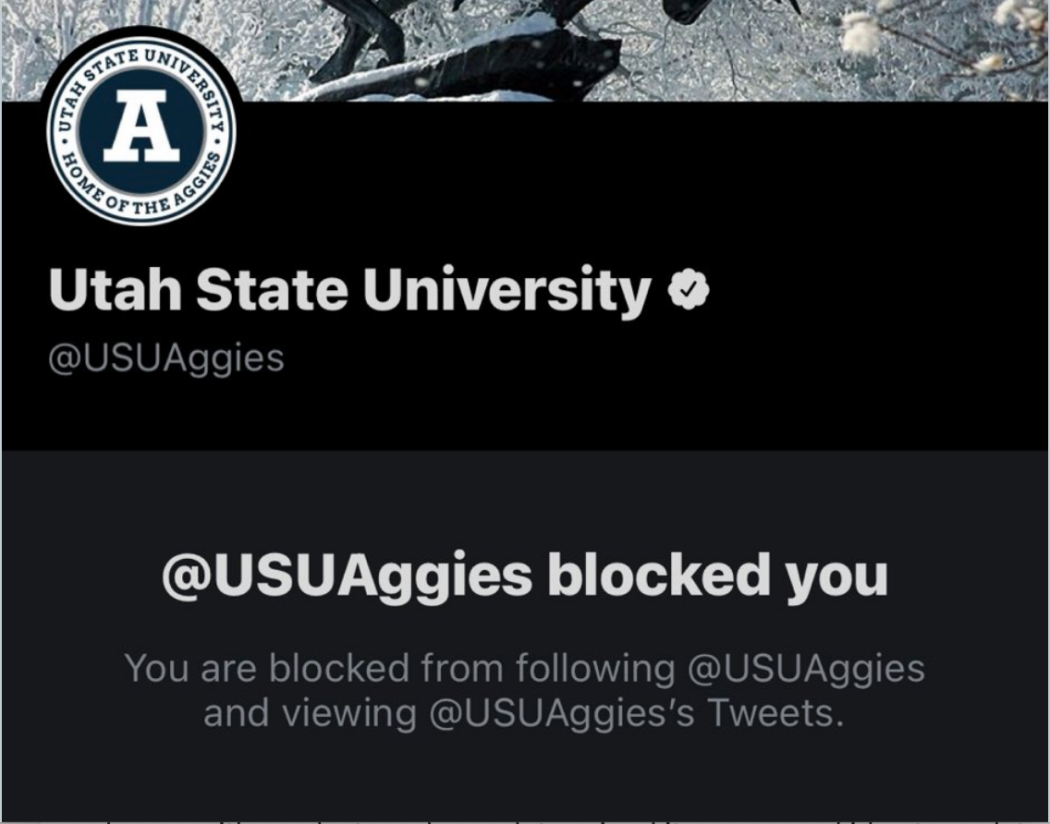
Given Bess’s comments didn’t contain any of the 3 criteria that would result in being blocked, I think the university official was wrong. I certainly don’t understand why the university’s reply to the question about a library back door posed by Bess was so flippant and ridiculous. The question seems to pose a legitimate safety concern and should have been answered respectfully and legitimately. However, I don’t understand why it is becoming increasingly common for individuals to lose civility and lower their own credibility by choosing to swear, particularly in a public forum, in reaction to even a small amount of provocation. We are losing the understanding that thoughtful, respectful dialogue between those engaged in difficult conversation is much more productive in finding common ground necessary to reach beneficial solutions.
Phenomenal article!